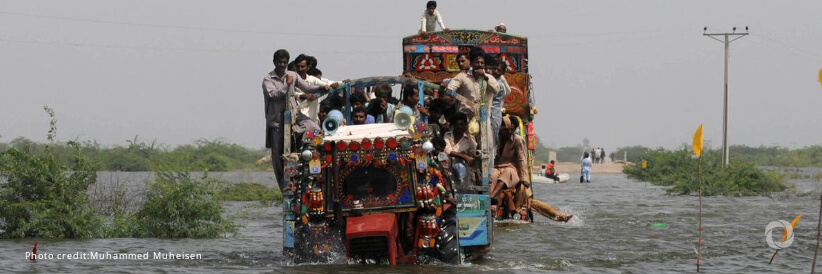As widespread flash floods in Pakistan continue to trigger waves of displacement, the International Federation of Red Cross and Red Crescent Societies (IFRC) and Pakistan Red Crescent are scaling up their humanitarian assistance.
In a revised emergency appeal, the IFRC is asking for CHF 55 million to assist three times more people than its original appeal— set at a one million target. The increased ask was prompted by the worsening situation, where a surge of flood-borne diseases and food inaccessibility is on the rise. In the areas where floods are receding, health and hygiene concerns, such as cholera, dengue, and malaria, pose severe threats to people’s well-being.
Pakistan has experienced an unusual amount of rainfall, three times higher than in the last three decades, which affected 33 million people, killing 1,700 others and displacing nearly 8 million from their homes. Hundreds of staff and volunteers have been working tirelessly since the onset of this disaster to assist those in need.
A new study from the World Weather Attribution—a group of international scientists including those from the Red Cross Red Crescent Climate Centre—found climate change likely intensified the rainfall that left huge swathes of Pakistan underwater and turned lives upside down.
More than two months into the floods, the IFRC and Pakistan Red Crescent have reached around 270,000 people in the most affected areas—delivering critical life-saving assistance including tents, food, clean water, and medical support. The revised appeal will strengthen the delivery of the ongoing response, with a focus on food, water, medical care, and shelter assistance through volunteers who are from the communities they serve.
Chairman of Pakistan Red Crescent, Sardar Shahid Ahmed Laghari, who has been visiting affected areas with emergency response teams over the past weeks says:
“The needs remain massive and keep on growing, and they are different for men, women, boys, and girls. Our staff and volunteers are inclusively working with these different groups from raising awareness to delivering interventions. It’s critical that families’ needs are met or these tragic floods will impact them in the long-term—just as people are suffering from the ongoing inflation and economic crisis.”
Through the strength of its staff and volunteers, the Pakistan Red Crescent has managed to access hard-to-reach communities in dire need of assistance.
The IFRC and its partners such as the German Red Cross, Norwegian Red Cross, and Turkish Red Crescent have been collaborating with the government and humanitarian groups to cater to the most vulnerable people, with a special focus on displaced families, women, and children.
Peter Ophoff, IFRC’s Head of Delegation in Pakistan, remarks: “This revised appeal will enable us to help the most vulnerable get back on their feet, especially those who live in the hard-to-reach areas. Before the lingering effects of this disaster turn into a catastrophe, IFRC is acting now in scaling up preventative public health interventions, including improved access to sanitation and increasing hygiene awareness of the emerging health crisis.
“Parallel interventions will also be made on shelter, livelihoods, and cash assistance.”

